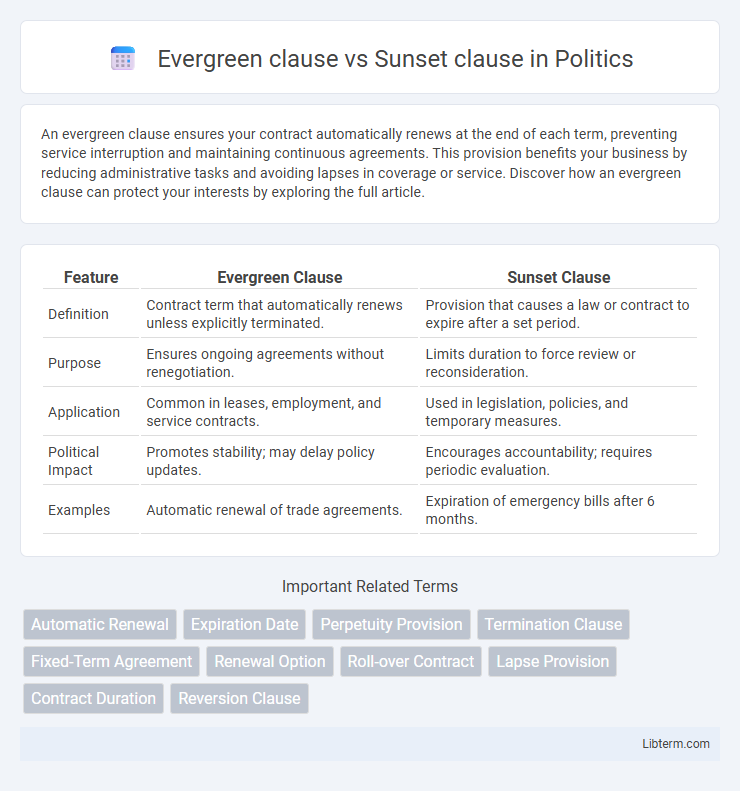An evergreen clause ensures your contract automatically renews at the end of each term, preventing service interruption and maintaining continuous agreements. This provision benefits your business by reducing administrative tasks and avoiding lapses in coverage or service. Discover how an evergreen clause can protect your interests by exploring the full article.
Table of Comparison
| Feature | Evergreen Clause | Sunset Clause |
|---|---|---|
| Definition | Contract term that automatically renews unless explicitly terminated. | Provision that causes a law or contract to expire after a set period. |
| Purpose | Ensures ongoing agreements without renegotiation. | Limits duration to force review or reconsideration. |
| Application | Common in leases, employment, and service contracts. | Used in legislation, policies, and temporary measures. |
| Political Impact | Promotes stability; may delay policy updates. | Encourages accountability; requires periodic evaluation. |
| Examples | Automatic renewal of trade agreements. | Expiration of emergency bills after 6 months. |
Introduction to Evergreen and Sunset Clauses
Evergreen clauses automatically renew contracts for successive periods unless one party gives notice to terminate, ensuring continuity without renegotiation. Sunset clauses set a predetermined expiration date for agreements, requiring explicit renewal or renegotiation to extend the contract. These provisions help manage contract duration and obligations, balancing long-term stability with flexibility in business arrangements.
Definition of Evergreen Clause
An Evergreen clause is a contract provision that automatically renews the agreement for successive periods unless one party provides notice of termination within a specified timeframe. This clause ensures continuous service or lease agreements by eliminating the need for renegotiation at each term's end. In contrast, a Sunset clause sets a predetermined expiration date for a contract or regulation, after which it terminates unless extended.
Definition of Sunset Clause
A Sunset Clause is a contractual provision that sets an expiration date for specific terms or the entire agreement unless renewed or extended by the parties involved. It ensures that certain obligations or rights automatically terminate after a defined period, encouraging periodic review and renegotiation. In contrast, an Evergreen Clause allows automatic renewal of the contract indefinitely unless one party opts out.
Key Differences Between Evergreen and Sunset Clauses
Evergreen clauses automatically renew contracts for consecutive periods unless a party provides notice of termination, ensuring continuous agreement without renegotiation. Sunset clauses specify a fixed expiration date for the contract or provision, requiring explicit renewal or renegotiation to extend its validity. Key differences include automatic renewal in evergreen clauses versus predefined termination in sunset clauses, impacting contract longevity and flexibility.
Legal Implications of Each Clause
Evergreen clauses automatically renew contracts unless one party provides notice to terminate, potentially creating long-term legal obligations and limiting flexibility in renegotiation. Sunset clauses set a predefined expiration date, ensuring contractual terms cease unless actively extended, which reduces the risk of unintended perpetual commitments. Legal implications of evergreen clauses often involve disputes over notice requirements and contract continuation, while sunset clauses emphasize the importance of timely renegotiation to maintain contractual relationships.
Advantages of Evergreen Clauses
Evergreen clauses ensure automatic renewal of contracts, minimizing the risk of service interruption and maintaining continuous business relationships. These clauses provide stability and predictability for both parties by eliminating the need for frequent renegotiations. This continuous engagement fosters long-term cooperation and reduces administrative costs associated with contract renewals.
Advantages of Sunset Clauses
Sunset clauses provide the advantage of ensuring periodic legislative review, preventing outdated laws from persisting indefinitely and encouraging adaptability in governance. They enhance accountability by requiring lawmakers to justify the continuation of a law based on its current effectiveness and relevance. This mechanism fosters legal clarity and reduces the risk of overregulation by automatically repealing provisions unless explicitly extended.
Common Uses in Contracts and Agreements
Evergreen clauses are commonly used in subscription services and lease agreements to ensure automatic renewal unless notice is provided, promoting continuity and reducing administrative burden. Sunset clauses frequently appear in legislative acts, technology agreements, and trial contracts to set a definitive end date or condition for termination, ensuring periodic review or phased discontinuation. Both clauses provide strategic control over contract duration, with evergreen clauses favoring ongoing terms and sunset clauses mandating expiration or renegotiation.
Considerations for Choosing the Right Clause
When choosing between an evergreen clause and a sunset clause, consider the contract's desired flexibility versus predetermined termination. Evergreen clauses automatically renew agreements, benefiting ongoing partnerships requiring stability and minimal administrative effort. Sunset clauses provide clear endpoints, ideal for projects with defined durations or conditions, reducing the risk of unintended contract extensions.
Conclusion: Which Clause Suits Your Needs?
Choosing between an evergreen clause and a sunset clause depends on the specific needs of your contract's longevity and flexibility. Evergreen clauses provide automatic renewal, ideal for ongoing services requiring continuous commitment without renegotiation. Sunset clauses suit agreements needing defined end dates or periodic review, offering control to terminate or revise terms as circumstances change.
Evergreen clause Infographic

 libterm.com
libterm.com